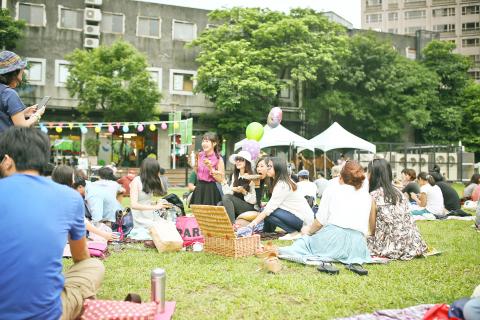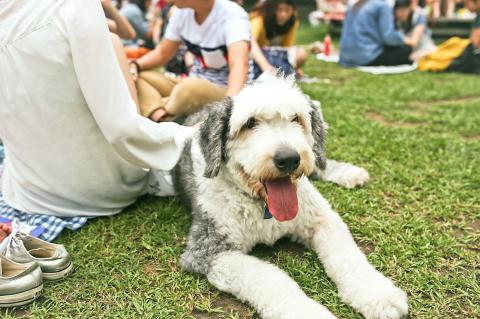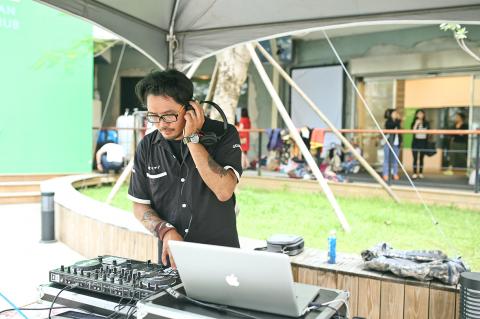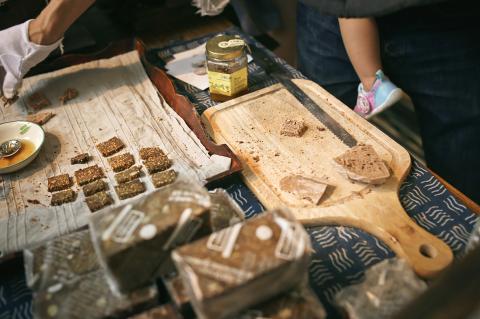With far more concrete than green space, Taipei isn’t feted for its lush parks and luxurious gardens. But surprisingly, picnics have become all the rage in the capital.
In June, some 8,000 urbanites turned up to a large picnic held at one of the city’s riverside parks. White Picnic Day (白色野餐日) took place in April and will return next month. And last Saturday, television network TLC held its second Picnic Day, after the first one proved fabulously popular last year.
With New Lawn as its theme, the Taipei Picnic Club (台北野餐俱樂部) will host a picnic event tomorrow on the Huashan Grassland (華山大草原).

Photo Courtesy of Taipei Picnic Club
“Most people associate parks with old people doing exercises ... Through the activity, we hope people can become more imaginative when shaping and utilizing public spaces,” says Charlie Huang (黃靖雯), co-founder of the club.
Walk in the park
Set up earlier this year by five friends who who met when they were studying in London, the Taipei Picnic Club launched its first event in May at the Chung Shan Creative Hub (中山創意基地). It attracted close to 2,000 picnickers.

Photo Courtesy of Taipei Picnic Club
Dave Chen (陳昱興), the club’s co-founder, held an earlier event in 2009, which was inspired by the Tokyo Picnic Club.
“My friends and I like picnicking, often in Da-an Forest Park. Older people, though, looked at us in an unfriendly way, as if we were weirdos,” Chen says.
Five years later, the club continues to challenge stereotypical assumptions about the use of parks by bringing different elements to the event — live music, for example. DJ Yen, math rock band Elephant Gym (大象體操) and indie rock veterans Freckles (雀斑) will perform.

Photo Courtesy of Taipei Picnic Club
Environmental issues will also be under the spotlight. Chan Hui-chen (詹慧珍) general secretary of Fairtrade Taiwan (台灣公平貿易協會), has been invited to talk about sustainable food, while Lee Jo–ning (李若寧) from Taiwan Youth Climate Coalition (台灣青年氣候聯盟) will share what she learned while exploring sustainable city projects in Brazil.
For families with children, the organizers have arranged an art workshop. Bookworms will want to check out the event’s mobile library.
When night falls, part of the meadow will be turned into an outdoor cinema where Pina, a documentary about late dancer Pina Bausch by German film maestro Wim Wenders, will be screened.

Photo Courtesy of Taipei Picnic Club
But the event doesn’t end on the grass. On Sunday, Ota Hiroshi, co-founder of the Tokyo Picnic Club, will attend a forum to share his experience. Another participating speaker is Choi Chi-hau (蔡志厚) from Hong Kong, who set up Lawnmap (草原地圖) in 2011 to encourage residents in Hong Kong to reclaim public green space. The forum starts at 3:30pm at the Chung Shan Creative Hub, 21, Minsheng E Rd Sec 1, Taipei City (台北市民生東路一段21號), free admission.
What to bring
While the mainstream media often focuses on the commercial side of picnicking by reporting on related products such as picnic baskets and blankets, coolers and outdoor outfits, Chen and Huang find it difficult to answer questions like what to bring to a picnic.

Photo Courtesy of Taipei Picnic Club
“A picnic is one of those simple things in life that can make people happy. It doesn’t have to be pretty or decorative. You just invite some friends, find a spot in a park and enjoy yourselves,” Chen says.
independent and free
Huang agrees, adding that there should be no requirement for having a picnic and that is why they want to keep the event free and independent.
“When you want to have a picnic, you can just go and do it. And that feels great,” she says.
The Taipei Picnic Club funds itself through FlyingV, a crowd-funding platform based in Taiwan.
Huashan Grassland is located at the intersection of Linsen North Road and Beiping East Road. The nearest MRT station is Shandao Temple MRT Station (善導寺捷運站) exit No. 1. For more information, go to the club’s Facebook page at www.facebook.com/taipeipicnicclub.

President William Lai (賴清德) yesterday delivered an address marking the first anniversary of his presidency. In the speech, Lai affirmed Taiwan’s global role in technology, trade and security. He announced economic and national security initiatives, and emphasized democratic values and cross-party cooperation. The following is the full text of his speech: Yesterday, outside of Beida Elementary School in New Taipei City’s Sanxia District (三峽), there was a major traffic accident that, sadly, claimed several lives and resulted in multiple injuries. The Executive Yuan immediately formed a task force, and last night I personally visited the victims in hospital. Central government agencies and the

Australia’s ABC last week published a piece on the recall campaign. The article emphasized the divisions in Taiwanese society and blamed the recall for worsening them. It quotes a supporter of the Taiwan People’s Party (TPP) as saying “I’m 43 years old, born and raised here, and I’ve never seen the country this divided in my entire life.” Apparently, as an adult, she slept through the post-election violence in 2000 and 2004 by the Chinese Nationalist Party (KMT), the veiled coup threats by the military when Chen Shui-bian (陳水扁) became president, the 2006 Red Shirt protests against him ginned up by

As with most of northern Thailand’s Chinese Nationalist Party (KMT) settlements, the village of Arunothai was only given a Thai name once the Thai government began in the 1970s to assert control over the border region and initiate a decades-long process of political integration. The village’s original name, bestowed by its Yunnanese founders when they first settled the valley in the late 1960s, was a Chinese name, Dagudi (大谷地), which literally translates as “a place for threshing rice.” At that time, these village founders did not know how permanent their settlement would be. Most of Arunothai’s first generation were soldiers

Among Thailand’s Chinese Nationalist Party (KMT) villages, a certain rivalry exists between Arunothai, the largest of these villages, and Mae Salong, which is currently the most prosperous. Historically, the rivalry stems from a split in KMT military factions in the early 1960s, which divided command and opium territories after Chiang Kai-shek (蔣介石) cut off open support in 1961 due to international pressure (see part two, “The KMT opium lords of the Golden Triangle,” on May 20). But today this rivalry manifests as a different kind of split, with Arunothai leading a pro-China faction and Mae Salong staunchly aligned to Taiwan.